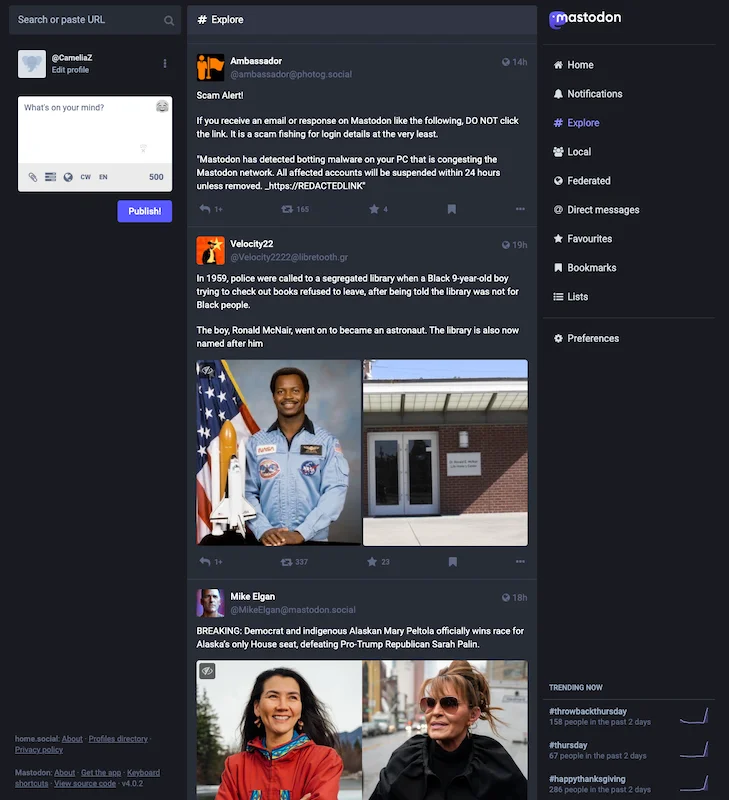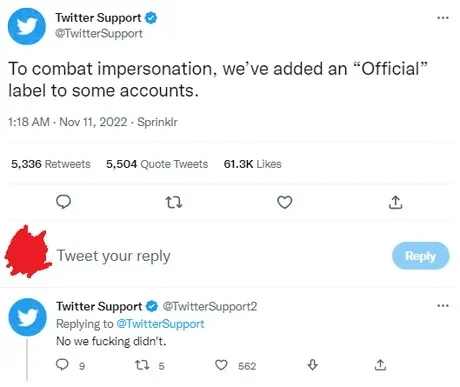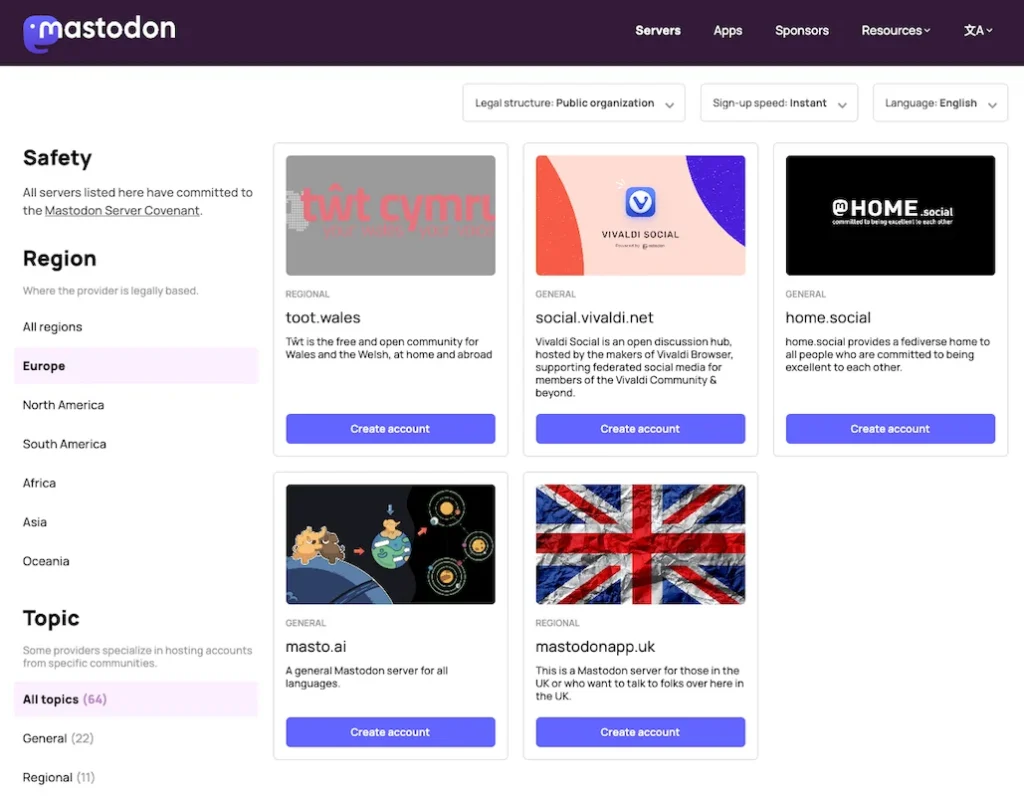Ever since Elon Musk bought Twitter and started making drastic changes like charging users $8/month to become verified, firing Twitter’s entire leadership team, and planning to fire more employees, many users who are not fans of him or his methods and principles have started to flee Twitter or at least search for alternative backups in case things turn really bad.
There are several well-known social networks that could work as substitutes for Twitter, such as Reddit, Discord, or Tumblr, but if you’re searching for “alternative to Twitter” on Google, the one that shows up as number one in most lists is Mastodon, and for good reason. While many social media networks can work as good vehicles for sharing thoughts and keeping your finger on the pulse of society, Mastodon is the one that mimics the look and feel of Twitter the best, so people who are used to the platform will tend to gravitate towards a similar one if they need to leave Twitter for whatever reason.

And with Twitter’s ever-changing policies, lack of security, and push for “free speech”, which can easily translate to hate speech in some cases, that reason might come sooner than later. Having to pay for a verified checkmark might be reason enough for many people to make the switch. I’m sure you’ve seen some of the memes going around after the new verification system was launched. Being able to pay for a verified account has allowed people to make fake accounts and post under a brand’s name, for instance, which was to be expected. Here are a few of the most hilarious impersonations:



So why should people choose Mastodon if they decide to leave Twitter or just want to have a backup option?
What is Mastodon?
Mastodon is a rather new decentralized social media platform that allows users to connect with each other without the need for a central server. This means that Mastodon is not controlled by any one company or organization and is instead operated by a network of individuals who run Mastodon servers. Mastodon users can communicate with each other regardless of which server they are using and can even follow users on other servers.
Mastodon has several notable features:
– Decentralized: There is no single point of failure. If one instance goes down, the others are still up and running.
– Free and open source: Mastodon is released under the GNU AGPLv3 license. This means that anyone can inspect, modify, and contribute to the code.
– Federated: Mastodon instances can communicate with each other. You can follow users from other instances and they can follow you back.
– 500-character limit: Posts are limited to 500 characters, which encourages more thoughtful communication.
– No ads: Mastodon is ad-free.
– Privacy-focused: Mastodon gives you control over who can see your posts. You can choose to make your account private, or you can choose to share your posts with the public.
Why is Mastodon important and relevant right now?
Created in 2016 by Eugen Rochko, Mastodon has been gaining popularity due to its focus on privacy and decentralization. Unlike other social media platforms, Mastodon does not collect or sell user data, and it is not controlled by any central authority. This makes it an attractive option for users who are concerned about their privacy, and who want to avoid being censored or controlled by a single company.
Mastodon is growing rapidly. In just the past year, it has seen a huge influx of new users, with 230,000 users joining after October 27, 2022, when Musk took the reins of Twitter. It is now one of the largest and most popular open-source social networks, with 655,000 monthly active users. Of course, this pales in comparison to Twitter’s 450 million monthly active users, but this growth is important because it shows that there is demand for a platform like Mastodon, and it gives us hope that Mastodon can become a major force for good in the online world.
Difference between Mastodon and Twitter
Mastodon is an open-source social networking platform that is very similar to Twitter. Both platforms allow users to post short messages (called “toots” on Mastodon) and follow other users. However, there are some key differences between the two platforms.
- Decentralized vs centralized
The first notable difference is that Mastodon is decentralized, meaning that there is no central server that all users connect to. This means that there is no single company or organization that controls the platform or content. Instead, the platform is decentralized and controlled by the community of users. This can be contrasted with traditional social media platforms like Facebook or Twitter, which are centralized and controlled by a single company.
Decentralized social media platforms have many benefits over traditional platforms. First, they are more resistant to censorship. Because there is no central authority that can control the content, it is much more difficult for governments or other groups to censor what is being said. This is especially important in countries where freedom of speech is not guaranteed. Second, decentralized social media platforms are usually more private and secure. Because there is no central authority that controls the data, it is much more difficult for hackers to access users’ data. This is especially important given the recent string of data breaches at major tech companies. Finally, decentralized social media platforms tend to be more democratic and transparent. Because the community of users controls the platform, decisions are typically made through consensus. This can contrast with traditional social media platforms like Twitter, where decisions are made by a small group of executives who may not be transparent about their decision-making process.
Decentralized social media is still a relatively new concept, and there are a limited number of platforms that currently exist. Some examples of decentralized social media platforms include Mastodon, Diaspora, and Steemit.
- Different algorithm
Mastodon uses a different algorithm for displaying posts in users’ timelines. Twitter shows users tweets from people they follow, in chronological order. Mastodon, on the other hand, shows users a mix of posts from people they follow, and posts that are popular among all Mastodon users. This makes it easier to discover new content and users on Mastodon.
- Different business model
Third, Mastodon has a different business model than Twitter. Twitter is a for-profit company that sells ads and user data. Mastodon, on the other hand, is mostly funded by donations and does not sell ads or user data.
- Better privacy
Mastodon has a more robust system of privacy controls than Twitter. Twitter only allows users to control who can see their tweets through a simple setting (public or private). Mastodon, on the other hand, allows users to control who can see their posts on a per-post basis and also offers a “direct messaging” feature that allows users to send private messages to each other. Overall, Mastodon is a more privacy-focused, community-driven platform.
What makes Mastodon safe?
Given that the platform is hosted on different servers and every server owner can basically create their own rules, it kind of sounds like a recipe for disaster at first glance. However, you will be surprised to see that many servers actually enforce stricter rules than Twitter since most of them are community-focused and not money-driven like Twitter and other similar social media giants.
But since on every platform, there are good and bad people alike, the emergence of platforms that will promote hate speech will be impossible to avoid. Luckily, Mastodon is driven by democracy and attracts mainly the kind of people that would be interested in moderating and flagging bad content, so whenever this happens, other servers can team up and ostracize the “bad apple” from the platform, essentially depriving them of the oxygen they need to thrive and be visible on the platform. Their posts will no longer be suggested on the feed, and other servers might choose to block their messages.
Additionally, Mastodon will only promote curated servers that have agreed to a list of basic rules like no racism, no sexism, no homophobia, no transphobia, and no hate speech.
How to sign up for Mastodon
If you’ve decided that you want to try Mastodon out, either in addition or in exchange for Twitter, you’ll have to go through a more elaborate sign-up process but it’s not that hard. The hardest part will be choosing a server (also called an instance) that you want to belong to. Since every server is operated by an individual or organization, it’s a bit confusing to know what to choose. However, Mastodon gives you a helping hand on their sign-up page. You will have to go on mastodon.social and start creating an account. The first thing that will pop up is an announcement letting you know that mastodon.social is not currently taking any new accounts, so you will have to choose a different server.

Then you will be given the chance to choose a server by region and topic, language, and sign-up speed (instant or manual review), and whether it is run by a private individual or public organization.

I chose a server based in Europe, run by a public organization, and with instant sign-up speed, which narrowed my choices by a lot.

I ended up choosing home.social. This is what it looks like, and these are the rules that you have to follow:


My advice is to not get stuck at the beginning, just pick a server that sounds good to you and see how it goes. The most important thing to keep in mind is that, whichever server you are on, you will be able to find and follow people on other Mastodon servers as well, see their posts in your home feed, and move your profile to a different server if you don’t like the one you’re on or find another one that resonates better with you. The cool thing is that, unlike with Twitter, you can choose by topic, so if you’re interested in a tight community of artists, you can find that on Mastodon.
Conclusion:
In the current social climate, tools like this one will spread like wildfire and become more and more popular. It is our responsibility to do our research and use the ones that match our beliefs and values. If you believe this is a good solution for you, go for it. Give it a try and see if it meets your needs.
P.S.: If you create a Mastodon account, don’t forget to follow our new Hot in Social Media account on Mastodon.












